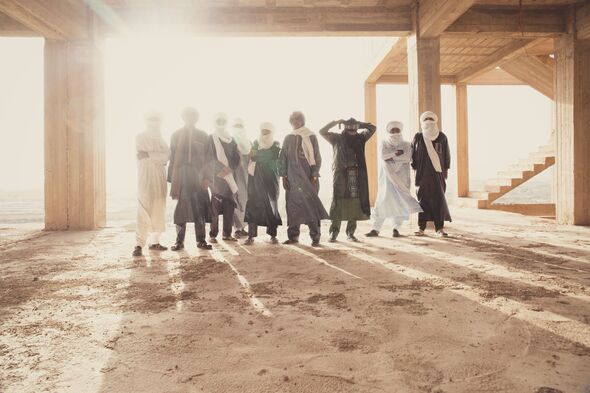|
Friday 24. 4.
info RESPECT FESTIVAL 2026 OPENING CONCERT The veterans of desert blues have influenced generations not only of African musicians and are the best-known African group today. Like blues or reggae, Tinariwen’s music is an expression of cultural identity — a testimony to suffering and to the power of overcoming it through music. „When I heard them for the first time, I found the music I had been searching for my whole life,“ said Robert Plant about these electric nomads of the Sahara. The group regularly appears at the world’s biggest festivals, won a Grammy for the album “Tassili” (2011) and the prestigious BBC World Music Award. At the Montreux Jazz Festival in Switzerland they jammed with Carlos Santana, who declared: „I hear the roots of Muddy Waters and Jeff Beck in them. That’s where this music comes from.“ “They grew up in exile, their school was conflict, they found refuge in the underground where they acquired the aura of legend. Tinariwen are the kind of band generations of Western rock groups could only become in their dreams.” – The Guardian The Sahara may seem like a wasteland, but the caravans that crossed it played as important a role as sea routes or the merchants who traveled the Silk Road between Europe and Asia. For centuries Saharan trade was controlled by the Tuareg — a people who mastered not only the art of survival but also the art of communication. Because the caravans connected black Africa in the south with Arabs and Berbers in the north, Tuareg music was easily understood on both sides of the desert. Life on the road requires mobile equipment; instead of huge drums you hear hands clapping. The result is expressive, mysterious music made with a minimum of instruments, akin to the rural form of American blues. Tinariwen built on this tradition with sharp electric-guitar ornaments and a deep feeling. It is the testimony of outlaws whose desert homeland was carved up by newly drawn borders. When you enter a North African market and close your eyes for a moment, you are surrounded by a backdrop full of seductive scents and unfamiliar, alluring tones. Time stops; somewhere beneath the chaotic mix of voices you catch a guitar, a hypnotic drum rhythm joins in, and even if you don’t understand the words, you feel the same thing as when you first heard the blues. Those stories tell of suffering and of the strength to resist it. While the roots of blues reach back to the era of slavery, for the Tuareg the wounds are much more recent. When African countries were gaining independence fifty years ago, paradoxically for the Tuareg this began an era of conflict and repression. The Sahara, their homeland, was divided by impassable borders and minefields. The Tuareg found themselves outlaws; their revolts were brutally suppressed. Tinariwen emerged amid wartime trauma — members met in a refugee camp and, alongside traditional inspirations, absorbed the music of Bob Marley, punk rock and electric guitars. Tinariwen were also at the origin of the now-legendary Festival in the Desert, which besides being a music showcase served as a tribal gathering for Tuareg from different parts of the Sahara. The festival took place from 2001–2009 at various locations in the northern Malian Sahara. The security situation in the region, however, deteriorated sharply: Islamist terrorists operated there, tourists were kidnapped, and the last editions of the festival (2010–2012) were held near Timbuktu under strict security measures. The situation was further complicated by the involvement of rival Tuareg groups in violent actions, and ultimately the musicians themselves became victims of the clashes. In August 2012 the militant Islamist group Ansar Dine declared that in the areas it controlled it would eradicate Satan’s music and replace it with Quranic verses, in accordance with Sharia law. In northern Mali, in the oasis of Kidal — once Tinariwen’s home town — a seven-man commando armed with AK-47 Kalashnikovs came to the family home of a local musician. He was fortunately not at home, but his sister heard the chilling message: “If he ever shows up here, we will cut off all the fingers he plays the guitar with.” The gunmen then hauled guitars, amplifiers, speakers, microphones and a drum kit out of the house, doused them with petrol and set them on fire. Tinariwen themselves became targets: during an attack in January 2013 band member Abdallah Ag Lamida was kidnapped while trying to save his guitars, though he was later released. The episode also marked the band’s trajectory — they temporarily moved out of the conflict zone to the United States and recorded their sixth album Emmaar" in the desert setting of Joshua Tree National Park. |
|









